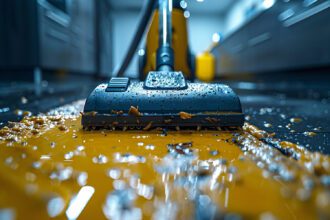The commercial cleaning industry has undergone significant transformations in recent years. With advancements in technology and growing concerns about environmental sustainability, manufacturers have been driven to innovate and improve their products. This article explores the latest innovations in commercial cleaning equipment, highlighting their impact on efficiency and productivity.
1. Electric and Autonomous Cleaning Equipment
Traditional gas-powered cleaning equipment is being replaced by electric and autonomous alternatives. These eco-friendly machines reduce carbon emissions and operating costs. For instance, electric floor scrubbers have become increasingly popular, offering improved maneuverability and reduced noise pollution.
Advantages of Electric Cleaning Equipment
Electric cleaning equipment offers several advantages over traditional gas-powered machinery. Firstly, they produce zero emissions, reducing the environmental impact of commercial cleaning operations. Secondly, electric machines are quieter and more comfortable to operate, improving user experience. Finally, they require less maintenance, resulting in reduced downtime and increased productivity.
Autonomous Cleaning Equipment: The Future of Commercial Cleaning
Autonomous cleaning equipment is revolutionizing the industry by increasing efficiency and reducing labor costs. These robots are equipped with advanced navigation systems, allowing them to move freely around commercial spaces without human intervention. Autonomous scrubbers, for example, can clean large areas quickly and accurately, freeing up staff to focus on other tasks.
2. Advanced Filtration Systems
Innovations in filtration technology have significantly improved the performance of commercial cleaning equipment. High-efficiency particulate air (HEPA) filters, for instance, capture 99.97% of particles as small as 0.3 microns, leaving floors and surfaces cleaner than ever before.
Benefits of Advanced Filtration Systems
Advanced filtration systems offer several benefits to commercial cleaning operations. Firstly, they improve indoor air quality by capturing airborne pollutants and allergens. Secondly, they reduce the risk of cross-contamination, ensuring a safer and healthier environment for occupants. Finally, advanced filters require less frequent replacement, reducing waste and operating costs.
3. Water Conservation Technology
Water conservation has become a critical concern in the commercial cleaning industry. Manufacturers have responded by developing innovative water-saving technologies. For example, some scrubbers use up to 70% less water than traditional machines, minimizing wastewater generation and reducing environmental impact.
Importance of Water Conservation
Water conservation is essential for sustainable commercial cleaning operations. Firstly, it reduces wastewater disposal costs and minimizes the environmental impact of cleaning activities. Secondly, conserving water helps reduce energy consumption associated with water treatment and transportation. Finally, water-saving technologies can help commercial cleaners comply with increasingly stringent environmental regulations.
4. IoT Integration and Data Analytics
The Internet of Things (IoT) has transformed various industries, including commercial cleaning. IoT-enabled cleaning equipment provides real-time data on machine performance, enabling operators to optimize their cleaning schedules and reduce waste.
Benefits of IoT Integration and Data Analytics
IoT integration and data analytics offer several benefits to commercial cleaning operations. Firstly, they provide actionable insights into equipment performance, allowing for prompt maintenance and reducing downtime. Secondly, data analytics help optimize cleaning schedules, ensuring that high-traffic areas receive adequate attention. Finally, IoT-enabled equipment can be monitored remotely, enabling operators to respond quickly to issues and improve overall efficiency.
5. Ergonomic Design and Operator Safety
Manufacturers have prioritized ergonomic design and operator safety in their latest innovations. Cleaning equipment is now designed to reduce fatigue and discomfort, ensuring that operators can work for extended periods without risk of injury.
Importance of Ergonomic Design and Operator Safety
Ergonomic design and operator safety are critical concerns in the commercial cleaning industry. Firstly, well-designed equipment reduces the risk of musculoskeletal disorders and other injuries, minimizing workers’ compensation claims and improving staff morale. Secondly, ergonomic equipment improves operator comfort, reducing fatigue and increasing productivity.
6. Modular Design and Easy Maintenance
Modular design has become a hallmark of modern commercial cleaning equipment. This innovative approach enables quick and easy maintenance, reducing downtime and increasing overall efficiency.
Benefits of Modular Design and Easy Maintenance
Modular design offers several benefits to commercial cleaning operations. Firstly, it reduces maintenance costs by enabling operators to replace individual components rather than entire machines. Secondly, modular design minimizes downtime, ensuring that equipment is available when needed. Finally, easy maintenance improves operator safety, reducing the risk of accidents and injuries.
7. Sustainable Cleaning Solutions
The commercial cleaning industry has shifted towards sustainable cleaning solutions, driven by growing environmental concerns. Manufacturers have responded by developing eco-friendly cleaning products and equipment designed to reduce waste and minimize environmental impact.
Importance of Sustainable Cleaning Solutions
Sustainable cleaning solutions are essential for environmentally responsible commercial cleaning operations. Firstly, they reduce waste generation and minimize the environmental impact of cleaning activities. Secondly, sustainable cleaning solutions help reduce greenhouse gas emissions associated with transportation and production. Finally, eco-friendly products improve indoor air quality, ensuring a healthier environment for occupants.
The commercial cleaning industry has undergone significant transformations in recent years, driven by advancements in technology and growing concerns about environmental sustainability. Innovations in electric and autonomous equipment, advanced filtration systems, water conservation technology, IoT integration, ergonomic design, modular design, and sustainable cleaning solutions have improved efficiency and productivity while reducing environmental impact. As the industry continues to evolve, it is essential for commercial cleaners to stay informed about the latest innovations and adopt sustainable practices to ensure a cleaner, healthier, and more environmentally responsible future.
